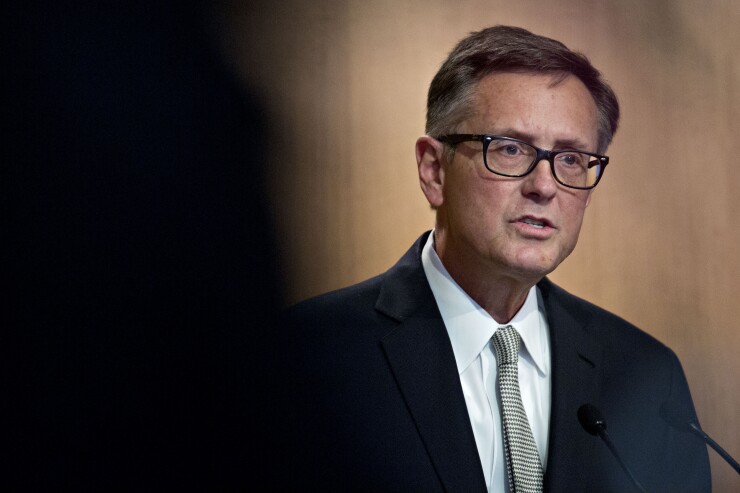With markets still digesting Friday’s news — the overwhelming victory of Boris Johnson in the U.K., which gives Brexit a green light, and the phase one agreement of a trade deal with China — one thing is clear: the Federal Reserve will keep rates steady.
Although it’s too soon to determine the impact of the trade pact, Federal Reserve Vice Chairman Richard Clarida said on Fox Business Network last week, “any reduction in uncertainty is a good thing.”

The news provides markets “much to cheer about,” and “gives the Fed more breathing room,” according to Dec Mullarkey, managing director, investment strategy at SLC Management. “Downside risks have been mitigated and this lifts the odds that Fed will be on hold for all of next year.”
The biggest impact has been in currencies, he said. The news helped weaken the dollar, “a key positive for U.S. exporters but also a significant windfall for emerging markets as the burden of their dollar issued debt drops.”
The pound hit three-year highs against the euro, “reflecting confidence that a Brexit blowup is unlikely,” Mullarkey added. “Johnson’s majority is very favorable for business and economic growth. He is no longer held hostage to a slim majority that was more wedded to ideology than broad economic consequences.”
These developments have “buoyed global sentiment and helped ease financial conditions which in turn improved asset prices.”
The news “diminished” the “most significant near-term tail risks,” said Steven Oh, global head of credit and fixed income at PineBridge Investments. But, “significant ongoing risks remain with respect to trade.”
While the news “will not necessarily boost the economy,” it removes “impediments to economic growth and downside recessionary concerns. Financial markets may react quickly in a positive fashion but direct economic impact will require a sustained outcome or stability that will result in confidence to make longer term investments.”
While the developments reduce “the likelihood of additional future rate cuts,” they don’t change policy and the need to hit “higher hurdles for both cutting rates or raising them. Given their insurance cuts were driven in large part by policy uncertainties, the bias toward more easing could become more balanced in the Fed’s future outlook.”
Some see the British election “injecting more uncertainty into global markets.” Zach Abraham, principal/CIO at Bulwark Capital Management, asks: “What does the EU look like after a U.K. departure?” Also, should the U.K. successfully exit the union, “which countries decide to follow suit? The EU as an institution is on the ropes. This doesn't help in any way.”
Abraham called the trade agreement “much ado about nothing. There appears to be no real resolution and certainly nothing enforceable.” He added, “You will know there's a real trade deal when enforcement and oversight mechanisms are agreed to as well.”
For now, the deal “appears to be nothing more than cosmetic market fodder as both leaders, Xi and Trump, need markets and their respective economies to continue to perform,” he said. “Markets will most likely love it but we don't expect to see real economic impact until an enforceable deal is in place."
Economic data
The National Association of Home Builders/Wells Fargo Housing Market Index surged to 76 in December, its highest level since June 1999, from an upwardly revised 71 in November, first reported as 70.
“While we are seeing near-term positive market conditions with a 50-year low for the unemployment rate and increased wage growth, we are still underbuilding due to supply-side constraints like labor and land availability,” said NAHB Chief Economist Robert Dietz. “Higher development costs are hurting affordability and dampening more robust construction growth.”
Separately, New York state manufacturing activity “remained subdued,” as the Empire State Manufacturing Survey’s general business conditions index gained to 3.5 in December from 2.9 in November. New orders slipped to 2.6 from 5.5 and shipments gained to 11.9 from 8.8.
The six-month ahead general business conditions index jumped to 29.8 from 19.4.





